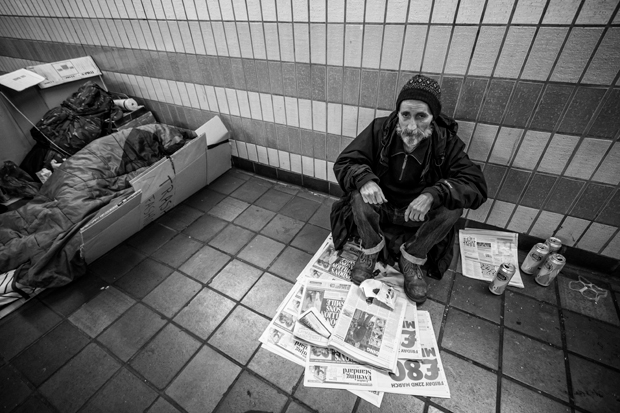‘I was born in London,’ Ben Judah tells us early in this vivid portrait of Britain’s capital, ‘but I no longer recognise the city.’ London has become a building site where dirty money is converted into gleaming blocks of bullion. The smartest parts of town are lined with empty houses owned by foreign plutocrats, and London’s spirit is embodied not so much by the bearded hipster brewing your £3 cup of coffee as by the Shard, a soaring monument to wealth and inequality.
Judah isn’t all that interested in the well-shod hirelings who lubricate this shiny capitalism. We’re halfway into the book before we encounter anyone who could be described as privileged (other than the widely-travelled, Oxford-educated Judah). Then it’s Nahla, a bored Egyptian who introduces him to a world of expensive nightclubs where rich young men from the Middle East sit surrounded by glinting champagne bottles. Later, he traipses along the King’s Road and observes the red-trousered swells lolloping towards Fulham — ‘a ghetto of signet rings’.
But mostly he focuses on the ‘immigrant city’ — the third of London’s population that was born abroad — and especially its paupers, earnest strivers and petty crims. The book’s cast consists of prostitutes and their patrons, pleading beggars and crack addicts rummaging in bins, jaundiced social workers and police officers dishing up heavily caffeinated insights. There are walk-on parts for loafers and gamblers, chatty cleaners and solemn imams. We see maids from the Philippines, ironing their master’s 40 new polo shirts, and Vietnamese gangs furtively wrapping little parcels of skunk. Judah mixes with builders from Poland and Lithuania who laugh at the English propensity for wasting their wage packets in the pub (rather than loading up with cans at the corner shop and necking them in the park), and he notices the Muslim girls who go to school carrying two bags, removing their hijabs and putting on make-up the moment they arrive.
Unsure whether to be alarmed or excited by London’s new flavours, Judah noses around its grubby highways and unfamiliar suburbs — Neasden, Catford, Plaistow. He listens and assiduously takes notes, waiting for golden epigrams to drop from the lips of the chancers and mendicants he encounters. It’s an avocation that demands patience. ‘Eighteen times I walked up and down the Old Kent Road,’ he reports, and that ancient, tired route is just the sort of place he finds fascinating. Once the joke of the Monopoly board — the game’s one location south of the Thames — it’s now puffed by estate agents and property journos; but Judah witnesses more misery than majesty. An almost pub-less and Cockney-free zone, it’s an artery channelling cheap labour into the City, and at four o’clock in the morning the pavements teem with cleaners coughing and shivering as they head towards the Square Mile to spruce up acres of carpet.
Judah mentions that he doesn’t look Anglo-Saxon and can therefore move among these people without attracting (much) suspicion. He spends time with the Romanians living in the tunnels beneath Marble Arch — ‘an invisible village’ — and passes himself off as a Russian in order to explore the doss-houses that glut some of East London’s shabbier parishes. A different kind of flexibility enables him to fall in with Moses, a Shepherd’s Bush drug-dealer who surveys his patch like a foreman inspecting a building site, and with Big Yaw, who breaks from picking up litter on the underground to show off a grainy film clip of the dream home he’s constructing in Ghana.
There’s more than a touch of George Orwell in Judah’s grimy tour. He shares Orwell’s appetite for fieldwork and documenting parts of society that are easily overlooked — for going native in his own country, to borrow an image from
V. S. Pritchett. But while Judah also shares Orwell’s bruised resilience and scepticism about British institutions, his prose is more impressionistic — and not as seductive.
A less obvious yet equally significant precursor is Henry Mayhew, the Victorian journalist and social reformer whose London Labour and the London Poor was the fruit of long urban rambles and bulged with startling details such as the number of cigar ends Londoners discarded each week (30,000). Like Mayhew, Judah enjoys brandishing statistics. ‘There are more illegals in London than Indians,’ he tells us, and: ‘A gun is fired in London on average every six hours.’ There are at least 7,000 prostitutes in London, and 96 per cent are immigrants. A white woman in a Chelsea town house can expect to live to nearly 90, whereas a Moroccan on an estate overlooking the Westway will be doing well if he makes it to 63.
The numbers are irresistibly quotable. But the real strength of This is London is the intimacy of its portraits — of Moses patrolling the White City favelas, the denizens of Harlesden’s betting shops (‘frazzled Jamaican bums and owlish Nigerian security guards, whimsical Polish carpenters and pouty Irish soaks’), and the so-called Plato of Edmonton, a mental-health worker who warns of the perils of multiculturalism while Judah perches on his faux-leather sofa. Though there are swathes of contemporary London that Judah barely acknowledges, and at times the mephitic air of a bad dream hangs too heavily over his testimony, this vision of ‘the world city’ is compassionate, fresh and courageous.






Comments